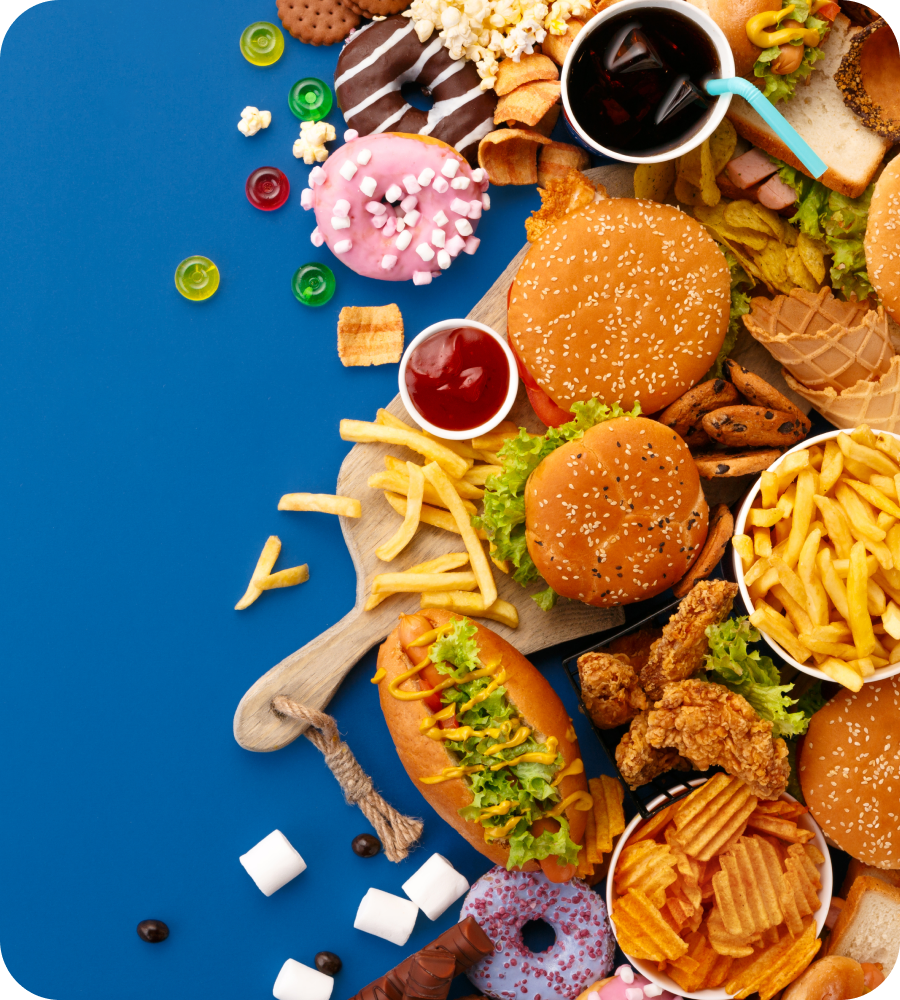If you are someone who is consistently into a routine of building muscle, you know what it takes- the sheer hard work, the daily grind, the self-motivation, and of course, eating right.
Key Takeways:
- 75% of total sugar, 46% of sodium, and 48% of saturated fat consumed by US adults are derived from junk food sources.
- Some of the worst foods you should avoid when building muscles include sugary snacks and beverages, excessive caffeine, highly processed foods, excessive high-fiber foods, white bread, and refined grains.
That being said, diet plays a very important role in shaping up your muscles and helping you pump up the whole process. There is no dearth of foods you must consider having in your diet for healthy muscle building. Similarly, there is no dearth of food you need to avoid in your diet when building muscle.
According to studies conduced on the US population conducted, 75% of total sugar, 46% of sodium, and 48% of saturated fat consumed by adults are derived from junk food sources. Well, these are alarming numbers and that is why the need to understand and know what you should and should not include in your diet increases even more, especially when you are working out daily.
We have curated a list of some of the worst food items that should be avoided when building muscle, bulking, and lifting.
12 Worst Foods to Avoid When Building Muscle


Not all foods are created equal when it comes to building lean muscle mass, and some can hinder your progress. Rely on lean protein sources to promote muscle growth, and you're on the right track. However, in this article, we will explore the 12 not-so-amazing foods you need to avoid when building muscle to help you achieve your fitness goals more effectively.
1) Sugary Beverages
Sugary beverages include soda, fruit juices, and energy sports drinks. These drinks are loaded with empty calories from sugar and provide little to no nutritional value. Excess sugar consumption can lead to weight gain and an increased risk of insulin resistance, which can hinder muscle growth. You can calculate your daily sugar intake using our calculator as well.
Instead of mindlessly drinking these beverages, opt for healthier options like water, herbal teas, coconut water, etc. to stay hydrated during your workouts and throughout the day. These options will help maintain your energy levels without the negative effects of excess sugar.
2) Highly Processed Foods
Highly processed foods are often rich in unhealthy fats, sugars, and artificial additives, making them a poor choice for anyone looking to build muscle. These foods can lead to weight gain and inflammation, which can impede muscle growth and recovery. Some common highly processed foods you should avoid are:
- Fast foods like burgers, pizza, and fries, including any deep-fried foods
- Packaged snacks like chips and cookies
- Frozen meals which are high in sodium and lack essential nutrients.
To promote muscle protein synthesis, focus on whole, minimally processed foods like lean meats, poultry, fish, whole grains, fruits, vegetables, and legumes. These foods provide the necessary nutrients and protein intake to support muscle development and overall health.
3) Excessive Alcohol
While it is okay to once in a while drink in moderation, excessive alcohol consumption can hinder your progress. Alcohol can disrupt your sleep patterns, interfere with protein synthesis, and dehydrate your body, all of which can impair muscle recovery and growth.
If you choose to consume alcohol, do so in moderation, and prioritize staying hydrated with water throughout the day. Limiting alcohol intake and avoiding binge drinking can help you achieve your muscle-building goals more effectively.
4) Sugary Snacks and Desserts
Believe it or not, we all have more than our fair share of daily snacks during our daily routine, especially the sugary ones. Be it during work or after a meal, a quick bite of something sweet delights our taste buds.
However, these treats are typically high in refined sugars, which can cause rapid spikes and crashes in blood sugar levels. They can also be surprisingly high in calories, leading to increased body fat. The resulting energy fluctuations can leave you feeling fatigued and less motivated to engage in intense workouts.
Instead of sugary snacks and desserts, choose healthier alternatives like Greek yogurt with berries, a piece of dark chocolate, or a homemade protein bar. For healthy carbohydrates, try a sweet potato or banana. These options provide a more stable source of energy and essential nutrients while satisfying your sweet cravings.
5) Excessively Salty Foods
Excessively salty foods can lead to water retention and bloating, which can obscure muscle definition and make you appear less lean. High sodium intake can also increase blood pressure and pose health risks over time.
To avoid excessive sodium intake, minimize your consumption of processed foods, canned soups, and salty snacks. When cooking at home, use herbs and spices to season your food instead of relying on salt. Opt for fresh, whole ingredients to support your muscle-building efforts while maintaining good overall health.
6) Trans Fats and Saturated Fats
Trans fats and saturated fats are the categories of fats that are considered ‘unhealthy’ and can negatively impact your muscle-building goals. These fats can increase inflammation, raise cholesterol levels, and lead to weight gain, which ultimately nullifies all your progress in the gym.
Avoid foods high in trans fats, such as fried foods and commercially baked goods. Limit your consumption of saturated fats found in red meat, full-fat dairy products, and certain processed foods.
Instead, focus on healthier sources of fats like avocados, nuts, seeds, and fatty fish, which provide essential nutrients and support muscle growth.
7) High-Fructose Corn Syrup
High-fructose corn syrup (HFCS) is a common sweetener used in many processed foods and beverages. It is known that HFCS has been linked to weight gain and increased insulin resistance, both of which can interfere with muscle development.
According to various studies, HFCS can induce metabolic dysregulation and reduced dopamine, which may contribute to compulsive eating.
To avoid HFCS, read food labels carefully and choose products with natural sweeteners like honey or maple syrup, or simply consume foods and beverages with little or no added sugar.
8) Excessive Caffeine
Who doesn’t love a freshly brewed cup of coffee?
While moderate caffeine intake can provide an energy boost and enhance workout performance, excessive caffeine consumption can lead to negative side effects such as jitteriness, anxiety, and disrupted sleep. Poor sleep quality can impair muscle recovery and growth.
Limit your caffeine intake to a reasonable amount, and avoid consuming caffeine-containing products close to bedtime. This will help you harness the benefits of caffeine for your workouts without compromising your sleep quality. Try our caffeine calculator to find your daily limit.
For healthy adults, the FDA has cited 400 milligrams a day, that's about four or five cups of coffee. Anything more than this has a high chance of posing health risks.
If you want an healthy alternative, Proffee is something you try.
9) White Bread and Refined Grains
White bread and refined grains lack the fiber and nutrients found in whole grains. They can cause rapid spikes and crashes in blood sugar levels, leading to energy fluctuations that can negatively impact your workouts.
To fuel your workouts effectively and support muscle growth, it's advisable to replace white bread and refined grains with whole grains like whole wheat, brown rice, quinoa, oats, and barley.
Whole grains provide a steady release of energy, sustained blood sugar levels, and essential nutrients that can help you power through your workouts and optimize your muscle-building efforts.
10) Low-Quality Protein Sources
Protein is a vital nutrient for muscle growth, but not all protein sources are created equal. Low-quality protein sources, such as processed meats and heavily processed plant-based protein products, may contain added preservatives, artificial flavors, and excessive sodium.
Choose high-quality protein sources like lean meats, poultry, fish, eggs, dairy products, tofu, tempeh, legumes, and quinoa. These options provide essential amino acids and support muscle development without the negative health effects associated with low-quality proteins.
11) Excessive High-Fiber Foods Before Workouts
High-fiber foods might sound like a surprise entrant in this list but yes, excessive amounts of it can potentially lead to health issues.
While high-fiber foods are generally healthy, consuming excessive amounts right before workouts can lead to digestive discomfort. High-fiber foods can cause bloating and gas, which can be uncomfortable during exercise and affect your performance.
12) Excessive Dairy Products
While dairy products are a good source of protein and calcium and consuming them in your diet can help foster healthy muscle gains, excessive consumption can lead to digestive discomfort, especially for individuals with lactose intolerance.
Your choice of dairy or dairy alternatives should be based on your individual preferences, dietary restrictions, and tolerance levels. Be sure to read labels when purchasing dairy products to ensure they align with your nutritional goals, and experiment with different options until you find what works best for you.


Conclusion

If we look at the crux of the whole process of building muscles, it's not just about what you eat. It is also a lot about what you don’t eat. So, choose the best for yourself. Focus on a diet rich in whole, nutrient-dense foods that support muscle growth. Prioritize lean proteins, whole grains, fruits, vegetables, and healthy fats.
Also, remember to stay hydrated, get enough sleep, and engage in regular exercise to maximize your muscle-building potential.
By making informed choices about your health, you can optimize your muscle-building journey and reap the rewards of a healthier, more muscular physique.
Frequently Asked Questions
Can I ever have treats or cheat meals while building muscle?
Yes, occasional treats or cheat meals are acceptable in moderation. The key is to not make them a regular part of your diet. Treats should be balanced with a nutrient-dense diet to ensure you meet your muscle-building goals.
Should I avoid all sources of fat when building muscle?
No, you should not avoid all sources of fat. Healthy fats, such as those found in avocados, olive oil, nuts, seeds, and fatty fish, are essential for overall health and hormone production. They should be included in a balanced diet to support muscle growth.
Can I follow a specific diet plan, such as keto or vegetarian, when building muscle?
Yes, you can follow specific diet plans while building muscle, but it's crucial to ensure that you meet your protein and nutrient needs. Consult with a registered dietitian or nutritionist to tailor the diet plan to your muscle-building goals.
Can supplements replace the need for a healthy diet when building muscle?
Supplements can be a useful addition to your diet but should not replace whole foods. Whole foods provide essential nutrients and fibers that supplements may lack. Consider supplements like protein powder, creatine, and branched-chain amino acids as complements to a well-rounded diet.
Is it necessary to count calories when building muscle, or can I focus on food quality alone?
While calorie counting is not always necessary, understanding your calorie intake can help you reach your muscle-building goals. It's essential to strike a balance between food quality and portion control to ensure you are consuming an appropriate number of calories for your activity level and goals.





















